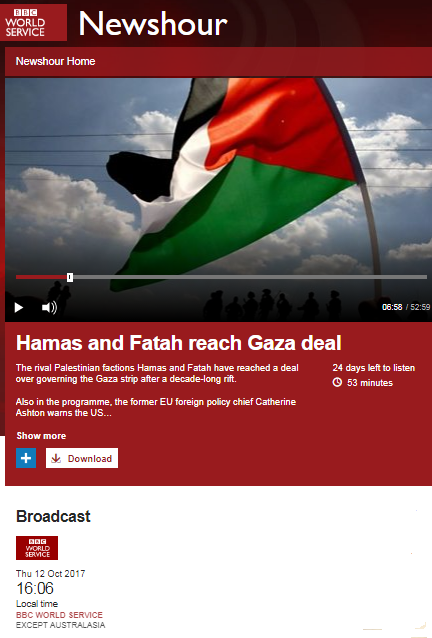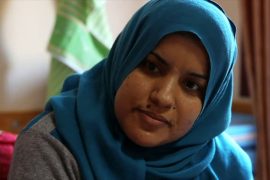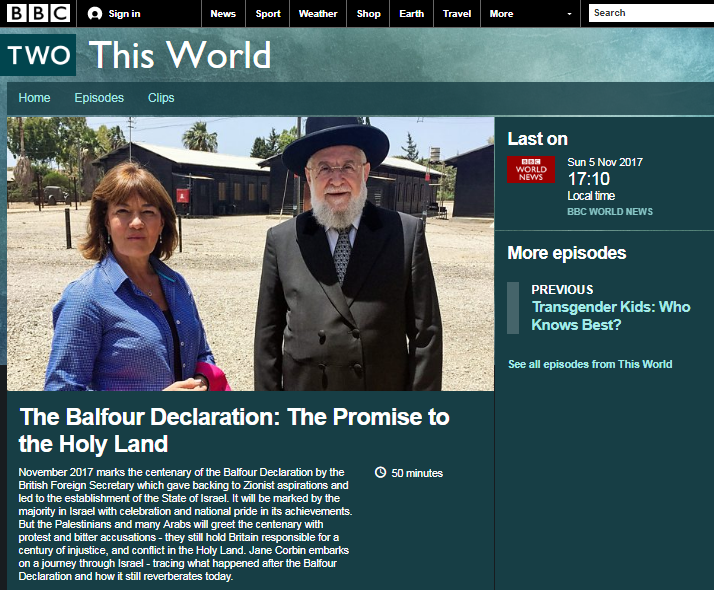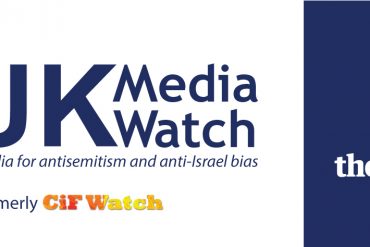On the evening of February 12th the BBC News website published a report headlined “UN lists 112 businesses linked to Israeli settlements” which, for reasons unknown, it chose to tag “Trump peace plan”.
The main image illustrating the report appears to show an Arab neighbourhood in Jerusalem near the anti-terrorist fence but is captioned “The settlements are seen as illegal under international law, although Israel disputes this”.
That partial but standard BBC mantra is of course repeated in the body of the article.
“About 600,000 Jews live in about 140 settlements built since Israel’s occupation of the West Bank and East Jerusalem in 1967. The settlements are widely considered illegal under international law, though Israel has always disputed this.”
The report promotes a version of a partisan map produced by the political NGO ‘B’tselem’ which has appeared in countless previous BBC News website reports. The map marks the Jewish Quarter of Jerusalem’s Old City as a “settlement” and fails to inform audiences that what are described as areas under “Palestinian civil control” and areas under “Israeli military and civil control” are in fact Areas A and B and Area C as designated under the Oslo Accords, to which the PLO was party.
Readers are told that:
“The UN human rights office has issued a long-awaited report on companies linked to Jewish settlements in the Israeli-occupied West Bank.
The report names 112 business entities the office says it has reasonable grounds to conclude have been involved in activities related to settlements.
They include Airbnb, Booking.com, Expedia Group and Motorola Solutions.”
The BBC does not clarify that the UNHRC’s blacklist also includes the Rami Levy supermarket chain (which is known as a model of co-existence between Israelis and Palestinians) and numerous companies providing services such as transport, water and telecommunications to both Israelis and Palestinians.
Later on readers are told that:
“In 2016, the UN Human Rights Council mandated the Office of the High Commissioner for Human Rights (OHCHR) to produce a database of companies involved in specific activities relating to settlements. […]
Following what it said was a thorough review and assessment of all information available, the OHCHR presented a report on Wednesday identifying 112 business entities that it said, there were reasonable grounds to conclude, had been involved in one or more of those activities.”
BBC audiences are not informed that members of the UNHRC at the time that the resolution (3136) requesting the compilation of that database was passed included human rights ‘beacons’ such as China, Saudi Arabia, Russia, Cuba, Qatar and Venezuela. Neither were they given any background information concerning the UNHRC’s infamous and long-standing bias against Israel.
The BBC’s report avoids all mention of the BDS supporting NGOs involved in the compilation of the blacklist. NGO Monitor notes that:
“The list was based on input from BDS groups, including Human Rights Watch. Many of the groups centrally involved receive significant funding from the EU and European governments. […]
Given that 85 of the 112 companies included on the blacklist are also found in the BDS NGO Who Profits’ database, and based on documentation seen by NGO Monitor, it is clear that the UN relied on this and other BDS actors as its sources of information.”
In light of that serious omission, the BBC’s decision to include part of a quote from Human Rights Watch in its report is particularly notable.
“Human Rights Watch said the list “should put all companies on notice: to do business with illegal settlements is to aid in the commission of war crimes.””
Although the BBC’s report claims that “There were no immediate comments from the companies named on the list”, one such comment is available here.
The BBC report amplifies comments made by a PA official:
“The Palestinian Authority’s Foreign Minister, Riyad al-Maliki, said: “The publication of the list of companies and parties operating in settlements is a victory for international law.”
He also called on the Human Rights Council member states to “issue recommendations and instructions to these companies to end their work immediately with the settlements”.”
However at no point in the article did the BBC bother to inform readers in its own words that there is no prohibition in international law from doing business in occupied or disputed territories.
Neither does the report make any effort to inform audiences of the fact that the UNHRC has taken no such action against companies operating in other occupied or disputed territories anywhere else in the world.
Given the BBC’s dismal record on informing audiences on the topic of UNHRC bias against Israel, its long-existing editorial policy of promoting a specific politically motivated narrative concerning ‘settlements’ and ‘international law’ and its promotion of the BDS campaign agenda, the serious omissions in this report come as no surprise whatsoever.
Related Articles:
BBC continues to obstruct audience understanding of UN bias




